#PYRAMIDS OF MEROË
Explore tagged Tumblr posts
Photo
The collar's place of origin is ancient Meroë in what is now Sudan, about 200 km northeast of the capital Khartoum. This was the residence of the Meroë Empire, which existed from 300 BC to the middle of the 4th century AD. The northern cemetery in the immediate vicinity of the city was occupied from about 250 BC to the middle of the 4th century AD - a period of use of about 600 years - and in its pyramid tombs thirty kings, eight reigning queens and three princes are buried.
One of the pyramids, Beg. N. 6, was built for the reigning queen Amanishakheto, whose burial dates back to the second half of the 1st century BC. This pyramid was almost completely destroyed in 1834 by the Italian Guiseppe Ferlini while searching for treasures. Even if his information on the deposit of the finds in the tomb superstructure is disputed today, their uniqueness is not. Irrespective of the discussion about the authenticity of the pieces, King Ludwig I of Bavaria acquired 90 objects for the collection there as early as 1840. In the 19th century, but only after Karl Richard Lepsius traveled to and studied the pyramids of Meroë as part of the Royal Prussian Expedition in 1844, the purchase of the majority of the items for the Berlin museums was completed. Among the grave finds, the vessels, the imported objects and the body jewelry should be mentioned in particular. The largest group by far, the body jewelry, includes over sixty signet rings, ten shield rings, ten bracelets, numerous chain links and pendants as well as amulets.
Two modern shoulder collars (ÄM 1755, 1757) were put together from countless pearls and amulets, as they are usually worn by royal and non-royal persons, but also gods in the relief depictions. However, these images do not provide any clues for a detailed reconstruction, as they consistently reproduce traditional, highly abstract patterns that have little to do with the actual appearance of such wide decorative collars. The term shoulder collar refers to the way it is worn, as the individual chain strands are placed in several rows over the wearer's shoulder and chest.
The tightly threaded shoulder collar includes uneven pearls in abstract form as well as numerous ankh signs, djed pillars, uraeus snakes, scarabs, udjat eyes and fish. The materials used were glass and faience of different colors, as well as carnelian, snail shells and stones.
(J. Helmbold-Doyé)

Pottery, glass, carnelian, and stone necklace or collar from the funerary cache of Queen Amanishakheto of Nubia (modern Sudan.) This is a modern creation using the found beads. Dates to the 1st century BCE to the 1st century CE. From the Egyptian Museum of Berlin.
#history#archaeology#jewellery#burials#meroë#sudan#kingdom of bavaria#germany#northern state of sudan#pyramids of meroë#amanishakheto#giuseppe ferlini#ludwig i of bavaria#karl richard lepsius#necklaces#amulets#collars#pearl#faience#carnelian#shell#ankh#djed#uraeus#scarabs#eye of horus
11 notes
·
View notes
Text

pyramids of meroë west, kabushiya, sudan by marco minari
12 notes
·
View notes
Photo
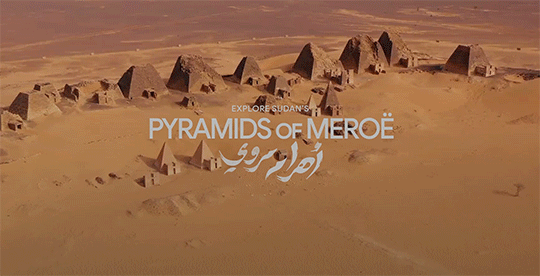
explore sudan’s pyramids of meroë
#gif#MEROË#sudan#PYRAMIDS OF MEROË#nubian pyramids#africa#ancient civilizations#unesco#google#google arts & culture#web experience#interactive experience#art experiments#kushite kingdom#meroe#desert#landscape#culture#pyramids#desktop experience#architecture#elements#check it out it’s really cool
7 notes
·
View notes
Text
Nubian pyramids, Northern Sudan: The Nubian pyramids were constructed by the rulers of the ancient Kushite kingdoms in the region of the Nile Valley known as Nubia, located in present-day northern Sudan. This area was the site of three ancient Kushite kingdoms. The capital of the first was at Kerma (2500–1500 BC), the second was centered on Napata (1000–300 BC) and the third was centered on Meroë (300 BC – 300 AD). Wikipedia
#Nubian pyramids#Ancient Kushite kingdoms#Nile Valley#Nubia#Egyptian architecture#UNESCO World Heritage Site#Northern Sudan#Africa
228 notes
·
View notes
Text
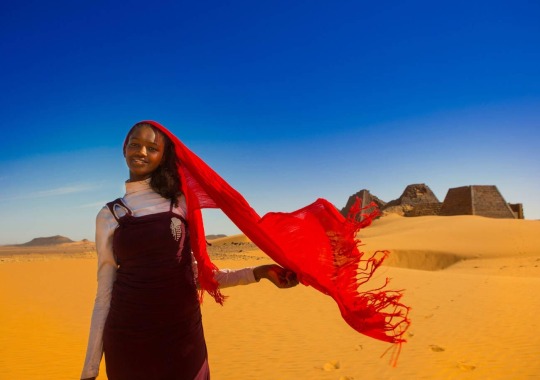
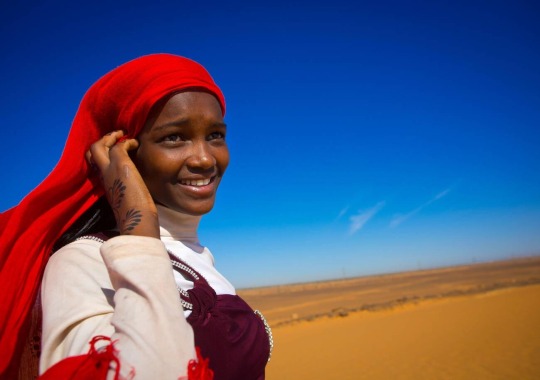
“Young Sudanese woman in front of the pyramids and tombs in Royal Cemetery, Meroë, Sudan.”
Photographed by Eric Lafforgue, 2012.
166 notes
·
View notes
Note
Continuing the TWST Boys Go to Reader's World??? headcanons, can I have the Third Years this time?
Reader is mentioned and only pronouns used are secondary pronouns. The amount of research going into this 😥😥

Trey Clover
Favorite Country/City: A lot of treats that he makes are from France, so I believe he would love being on the tasting side of the whole ordeal. Plus, candied violets (originally called violettes cristallisees) originate from there as well. As for his favorite city, it’s basic but it’s Paris. It’s the dessert capital of France, so yeah.
Favorite Cuisine/Dish: He is a bit of a connoisseur when it comes to multiple different cuisines, as people from all over have come to his family’s bakery. However, if he had to choose one, it would have to be Spanish cuisine. He just strikes me as the type. French food would come in second, but we are going by entrees and not desserts.
Favorite Drink: I feel like he would be a bit tired of tea, and coffee goes well with a lot of sweets but sometimes he wants something else. So, hot chocolate is a great go-to. Plus, you can spike it with bourbon or rum and many other things, and he prefers bourbon.
Favorite Souvenir: A cognac that he has used to cook multiple different things. He picked it up at a small shop in France, and the brandy is great for making sauces and for deglazing a pan. He rarely drinks it, but it’s of great quality.
Favorite Singers/Songs: He is an old soul, and with that being said, he likes older music. I feel like he would like songs in different languages as well. So, I think he would like the song Nunca es Suficiente, the Natalia Lafourcade version.
Favorite Movie: He doesn’t have a favorite movie, but rather favorite shows. He loves Nailed It!, Zumbo’s Just Desserts, Sugar Rush, but most importantly: The Great British Baking Show.
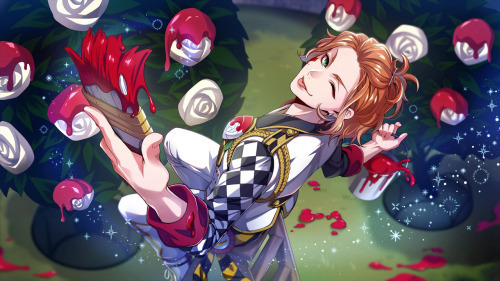
Cater Diamond
Favorite Country/City: This guy is hard because he would want to go absolutely everywhere and he would love everywhere he travels to. However, he would say that he loved Japan the most, as the people were very friendly and it was the first time he actually tried hard to learn the language so that he could be respectful.
Favorite Cuisine/Dish: His canonical favorite food is spicy ramen, so I would say Japanese cuisine would be his favorite. But, he has a more diverse taste than just that, so he would probably like Eastern Asian cuisine as a whole. It has a lot of savory and spicy foods that he absolutely loves.
Favorite Drink: He is also a margarita lover, and even though a lot of them are sweet, they are still delicious. However, he orders salt rather than sugar on the rim of the cup because he doesn’t want extra sweetness from sugar.
Favorite Souvenir: He picked up a pair of chopsticks that he always uses. He has finally got chopstick etiquette down, and the set he purchased at a souvenir shop served as a reminder of his hard work.
Favorite Singers/Songs: He is so into both K-Pop and J-Pop that it’s not even funny. He is one of those fans that will tear you up if you didn’t know the words, their meaning, who all the members in the specific group are, etc.
Favorite Movie: I had no idea he was into skateboarding, so I have to say that his favorite movie is Dogtown and Z-Boys. It’s a documentary-type film about the Zephyr skateboard team who helped develop modern skateboarding in the ‘70’s.
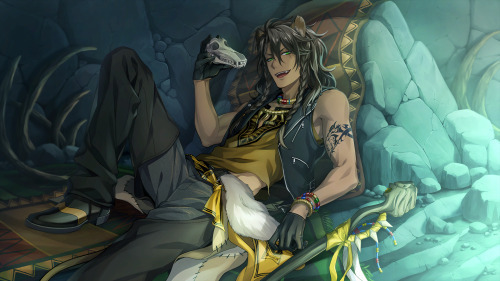
Leona Kingscholar
Favorite Country/City: He is not one to travel voluntarily, so you would have to drag him places. He does want to spoil you, so he will (hesitantly) go along with you. If he had to choose a favorite, it would be Sudan. He doesn’t have a favorite city, but rather a favorite state: the River Nile state. It holds the Meroë Pyramids, and he thought it was pretty cool that Sudan has the most pyramids in the world.
Favorite Cuisine: Pretty far from Sudan, but Argentinian food would be his favorite. They are known for having the best beef, and Leona loves having a good steak. The only downside is that it’s usually served with a few veggies or a chimichurri sauce composed of vegetables.
Favorite Drink: He doesn’t really care, so I would think that he likes beer. He strikes me as the type to have a glass bottle of beer that he holds nearer to his hip; the traditional uncle (Unca) pose.
Favorite Souvenir: When he first went to Sudan, he dressed to fit along with local traditions. He wore a jalabiya in order to maintain modesty, and he actually liked it and hung it in his closet for the next time he visited a country that prefers modesty.
Favorite Singers/Songs: It started as him getting into his edgy phase, but he did not want to go emo. He prefers rock, specifically AC/DC. His favorite song is Highway to Hell.
Favorite Movie: He usually falls asleep during every movie he watches. However, he did like the movie Silence of the Lambs. The way it left him disturbed and on-guard as well as made him want to stay awake is the reason why he would like such a gruesome movie.

Vil Schoenheit
Favorite Country/City: Cologne, Germany. I’ve always wanted to visit, and it was one of my hyperfixations for a while, but that’s besides the point. The point is that Vil strives for perfection. Part of that is smelling great. Surprise, surprise: cologne originates from Cologne. However, the Cologne Cathedral was beautiful as well.
Favorite Cuisine: I feel like he would like Japanese food as his go-to, as a lot of their food is a lot healthier than others and he strives to be healthy. However, he would like Greek food if he were just going off of personal preference. Briam would probably be his favorite dish.
Favorite Drink: Do smoothies count as food or drinks? People have them for breakfast as they have fruits and veggies, but you ‘drink’ a smoothie. Anyways, his favorite alcoholic drink would be a martini. He is classy and elegant, just like the drink.
Favorite Souvenir: A piece of the Berlin Wall. The history behind it fascinated Vil, and he considers it his most prized souvenir.
Favorite Singers/Songs: Lovefool by Postmodern Jukebox (feat. Haley Reinhart). He heard it from a co-star, and he liked it. Yes, he continues his career in your world.
Favorite Movie: Breakfast at Tiffany’s, as I believe that he loves Audrey Hepburn’s acting in that movie. He also likes Gentlemen Prefer Blondes because of Marilyn Monroe and her iconic character in that movie.

Rook Hunt
Favorite Country/City: The city of love, the city of lights, Paris. As much as I didn’t want to do such a basic answer, he is a connoisseur of beauty, and Paris at night is a sight to behold. Plus, he speaks French, so why not go to the motherland of the French language?
Favorite Cuisine: His favorite food is canonically liver pâté, so I believe he would love French cuisine the most. However, I would say that Danish cuisine comes second, as they have something similar (a dish that is derived from liver pâté: leverpostej).
Favorite Drink: A French 75 goes a long way with this man. He loves a champagne cocktail. They are typically for celebrations, and Rook just wishes to celebrate life and beauty as a whole. No, he’s not an alcoholic, but when he feels content and exceedingly happy he won’t hesitate in indulging himself with one glass.
Favorite Souvenir: A lavender perfume. He loves how relaxing the smell is.
Favorite Singers/Songs: His favorite song is Love Like You, by Caleb Hyles. Look at the lyrics, and you will see why lol.
Favorite Movie: The Notebook, as it’s a classic film filled with romance. You also cannot tell me that this man is not looking for the Allie to his Noah. He wants a romance story in his life, and that’s why he travels so much.

Idia Shroud
Favorite Country/City: I can’t decide between Greece and Japan, so I will say that they are tied on Idia’s list. The gamer boy doesn’t really go outside, but when he traveled to these places he absolutely loved it. He’s kind of simple, where he liked the capitals Athens and Tokyo the most.
Favorite Cuisine: His favorite food is just listed as ‘sweets’, and he hates raw fish. We are not going by desserts, but rather overall food, and luckily fish can be replaced by protein alternatives. Plus, the fish can be cooked. That being said, Chinese food would be his favorite. He loves the dragon’s beard candy.
Favorite Drink: He rarely ever drinks alcoholic drinks, as he is already very weak in build (remember his family’s curse?). Adding alcohol to the mix would be a disaster. However, he might like a light beer.
Favorite Souvenir: He likes board games, and while he was in Greece he learned to play Tavli, or Backgammon, and he purchased a board so that he could continue to play it with opponents.
Favorite Singers/Songs: He likes anime intros and outros, and like Cater he is very big on K-Pop and J-Pop, but also C-Pop and T-Pop. His favorite song is 夜に駆ける(Yoru ni Kakeru), by YOASOBI.
Favorite Movie: Your Name, as the two travel just to meet each other, but they have to get used to their new environments first.
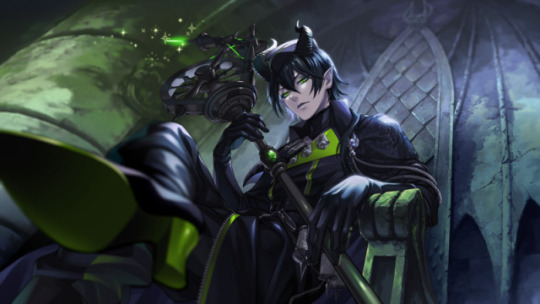
Malleus Draconia
Favorite Country/City: He loves Denmark’s castles, but specifically the Rosenborg Castle in Copenhagen. It houses the Danish Crown Jewels as well as the Coronation Robe, and the history behind each item fascinated the draconian prince. The Notre Dame Cathedral in France comes in second for its gargoyles.
Favorite Cuisine: Again, we go by overall cuisine rather than the desserts (otherwise he would choose the cuisines that contributed to ice cream’s existence). He actually can’t choose a favorite, as all is better than Lilia’s cooking. He does have a least favorite, and it’s modern American food. His favorite type of food is street food, as it really allows him to surround himself with the locals and just be normal.
Favorite Drink: He doesn’t believe alcohol is necessary to have fun, but he will indulge himself from time to time. His favorite is a cocktail called a ‘Corpse Reviver’. It’s a morbid name, but it’s the one thing that magic can’t do. He likes when red food coloring is added, as it makes his tongue red.
Favorite Souvenir: Bro probably has enough money to actually purchase the Danish Crown Jewels as well as the English Crown Jewels tbh. Anyways, he actually treasures a book he picked up called ‘Once Upon a Broken Heart’. He was unaware that it was the first book of a sequel series, so he purchased the rest as well as the original series, ‘Caraval’.
Favorite Singers/Songs: His talent is listed as ‘stringed instruments’, but his relent would go beyond just the typical instruments you think of. Is an electric guitar not a stringed instrument? This man is in a 5 Finger Death Punch phase, favorite song being Wrong Side of Heaven.
Favorite Movie: He loves Sleeping Beauty, mostly because of that scene with Aurora and Prince Phillip where they dance together in the forest. Also, he related to Maleficent because she was not invited to see the princess.
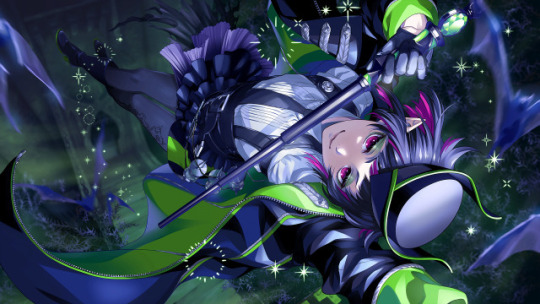
Lilia Vanrouge
Favorite Country/City: His hobby is traveling alone, and I feel like he wouldn’t have a favorite location. He has been everywhere, and the only place he gravitated towards was Brazil. He went to that year’s Carnaval celebration and he actually really liked it. The parade floats were big and beautiful, there were many lights; it was just fun in general. The city of São Paulo comes to mind, as it’s the biggest city by population.
Favorite Cuisine: Part of why he likes Brazil is the food. Tomatoes originate from South America, and Brazil’s dishes hit different (I don’t think I’ve been to an authentic Brazilian food place, but from what I can see and from what I’ve tasted, I love it).
Favorite Drink: In the Trivia section of his Wiki page, it says that he likes potions that are said to taste bitter by everyone else. That being said, I feel like this would transfer to alcoholic drinks, so his favorite drink might be a negroni. It’s a bit bitter, so it suits his taste.
Favorite Souvenir: He picked up some spices in his travels to “better” his cooking (it didn’t help at all; his cooking still sucks even if he’s seen other people do the dishes he's trying to make).
Favorite Singers/Songs: He is what boomers would call “hip and trendy”, so he likes whatever is popular at the moment. Yes, this includes the meme songs that might go viral on TikTok, Instagram, and YT Shorts. At the time of writing this, his favorite song would be Paint the Town Red, by Doja Cat.
Favorite Movie: He liked the movie Crimson Peak. The costumes as well as the acting were amazing, and he loves learning about the Victorian Era and how both England and the United States were developing during the industrial era.
#twst#twst x reader#disney twisted wonderland#twisted wonderland#disney twst#twisted wonderland x reader#twst wonderland#trey#twst trey x reader#trey clover x reader#trey x reader#twst trey#trey clover#twst trey clover x reader#twst trey clover#cater x reader#twst cater#cater diamond x reader#cater diamond#cater#twst cater diamond x reader#twst cater diamond#twst cater x reader#leona#twst leona x reader#twst leona#leona kingscholar x reader#leona x reader#leona kingscholar#twst leona kingscholar x reader
103 notes
·
View notes
Note

Pyramids of Meroë, Nubia, Sudan
11 notes
·
View notes
Text
i'm gonna go on a whole tangent on this.
i've seen this post going around and i've always avoided liking it or commenting cause honestly, this post is bits of INNACURACY and doesn't even begin to show the beauty of African culture.
i live in Africa [looking at you comments about Africans having 'spotty wifi' and 'not a lot of Africans have tumblr' (this was in 2017 and i've been on tumblr since 2015 :D!)] - not going to mention where specifically. [ik these comments are from 2017 but trust me, sometimes you can still get comments like these today. lmfao]
but i firstly want to start of with: there is NO SUCH PLACE CALLED MAKO. there is however, an informal settlement called Makoko (found in Lagos, Nigeria.) and it looks nothing like pictured above.
secondly, i'm seeing a whole lot of idiotic comments like "what's the wood for?" and honestly, a minute of thinking would answer your questions - this is me saying stop being such assholes about another country's infrastructure regardless of the damn materials they use.
bamboo and/or timber -The wooden poles in the structures form Burkina Faso and Mali are essentially permanent scaffolding
thatch, woven grass, reed walls - allows easy ventilation
mud - ENVIRONMENTALLY FRIENDLY, inexpensive.
the third image in the post is terribly lackluster of you cause that shot sucks and doesn't even capture how amazing it is. that mosque in Burkina Faso is called: The Grand Mosque of Bobo-Dioulasso
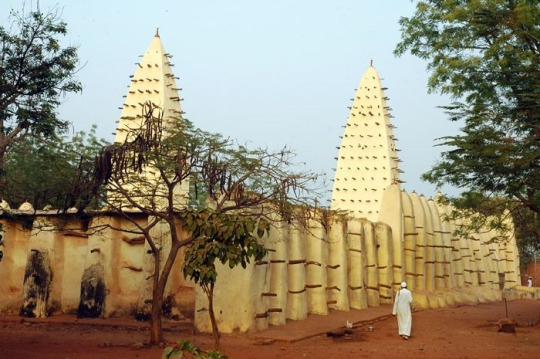
lastly, there are 54 COUNTRIES in Africa.
this only touches like, two. and i know because this post is from 2017 possibly the photos available then aren't like today thus i'm gonna just yeet them below :D.
Painted Gurunsi houses of Tiébélé — Burkina Faso
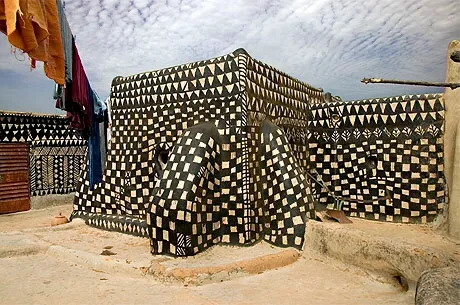
Beehive huts — Eswatini
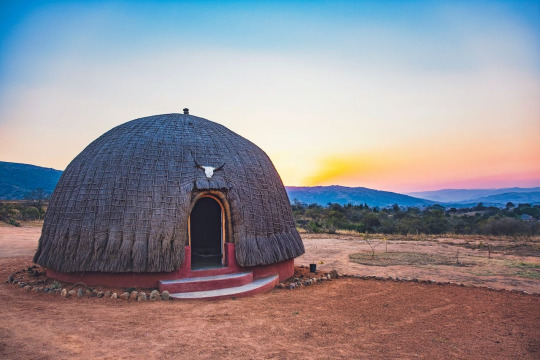
African Heritage House — Kenya
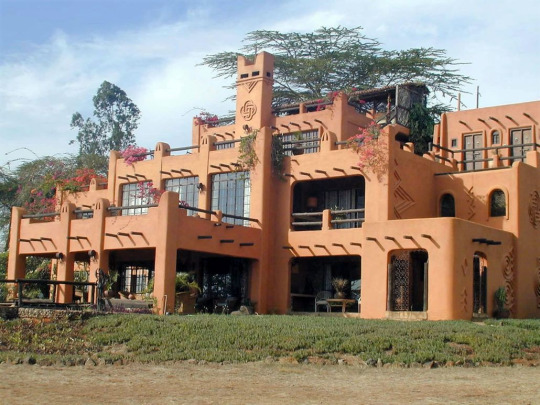
Mua Mission — Malawi
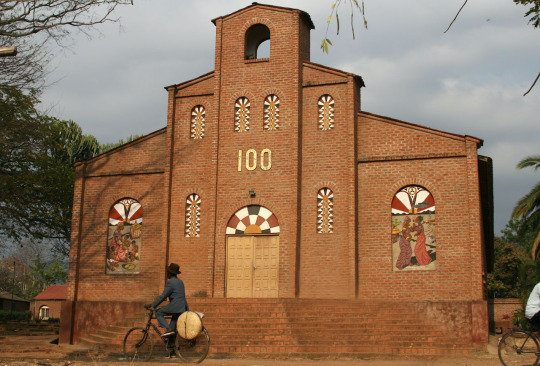
Great Mosque of Djenné — Mali
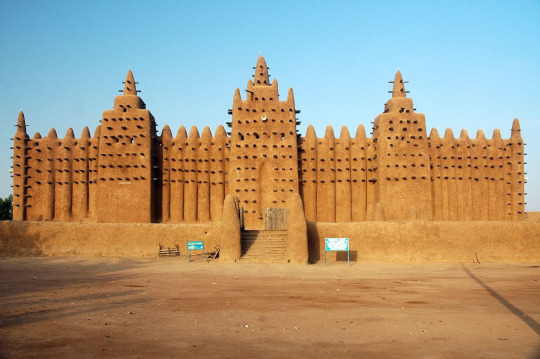
Stone Tower of Chinguetti — Mauritania
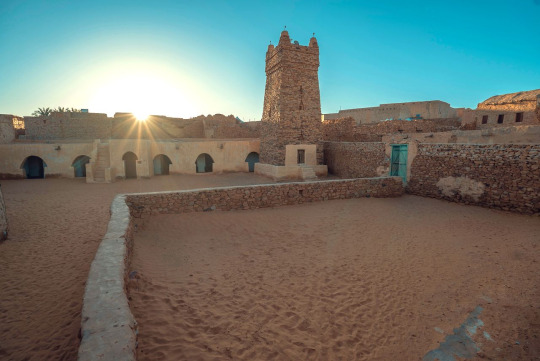
Bab Mansour Laleuj — Morocco
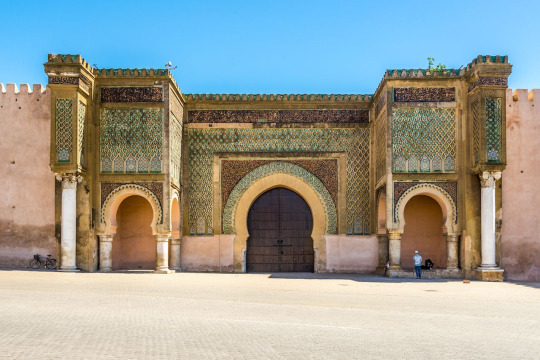
King’s Palace — Rwanda
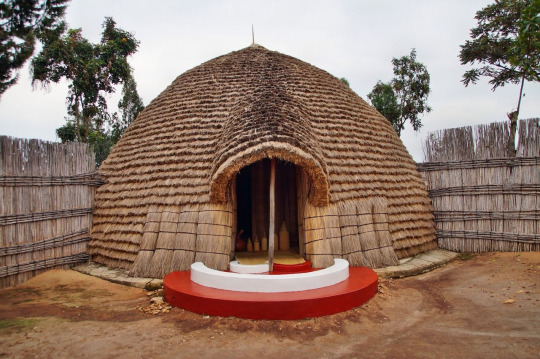
Meroë pyramids — Sudan
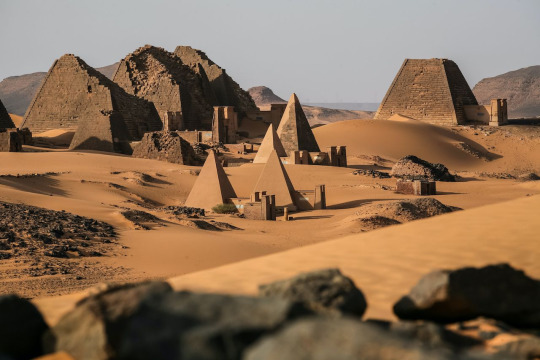
*YEAH THEY'RE PYRAMIDS IN SUDAN TOO.
Clay Palace of Ghardaïa — Algeria
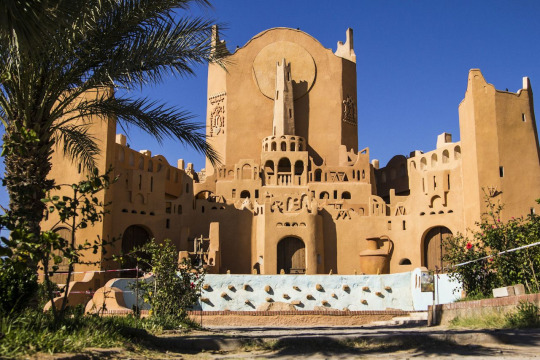
there's obviously wayy more but these are the ones i remember at the top of my head. i didn't see anyone adding anything else so i feel obligated to lol.
some really beautiful african architecture because honestly this site is so western-centric
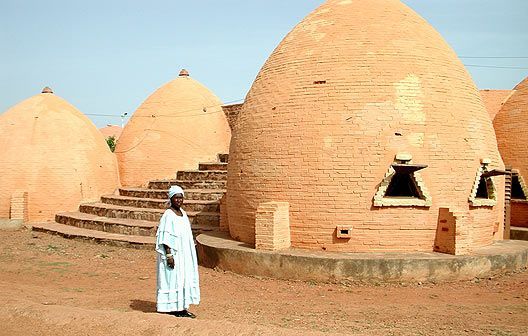
mako

unknown
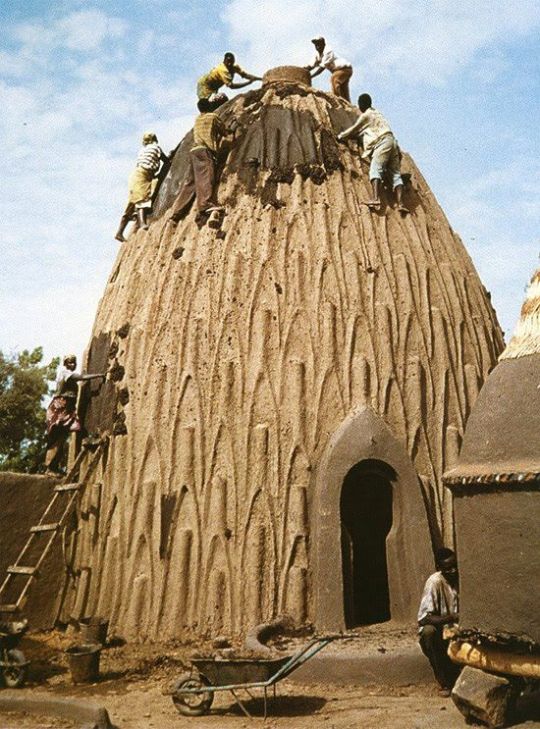
cameroon
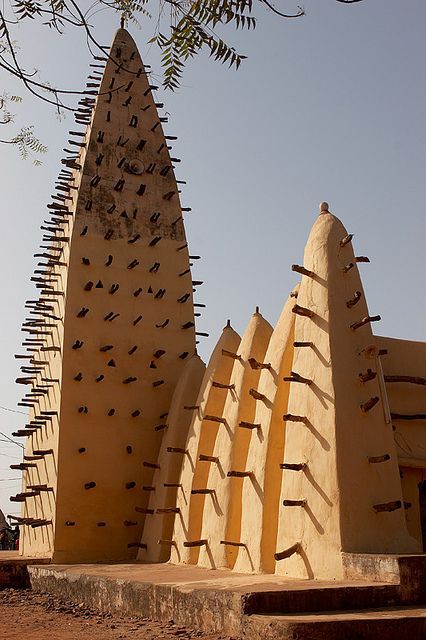
burkina faso
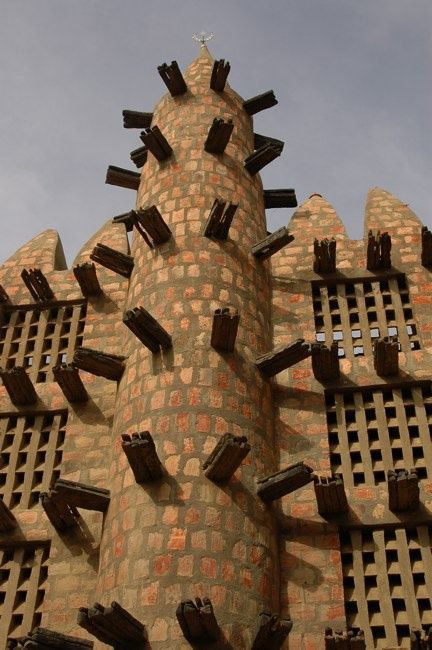
mali

Ndebele
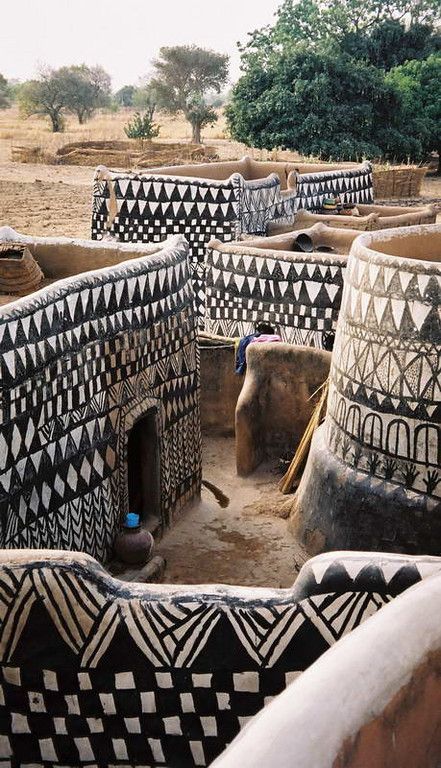
burkina faso
please add more if you can!
#africa#african architecture#fix-it post ig??#i started writing this way back in July lol#tag: seis.tho(ugh)ts
270K notes
·
View notes
Text
vimeo
Google Arts & Culture - Pyramids of Meroë - draw&code
0 notes
Text
vimeo
Google Arts & Culture - Pyramids of Meroë - draw&code
0 notes
Text
Untold Story of Martin Luther King
Legends of Love, Power, and History: Exploring Stories That Shaped Our World
Throughout history, tales of empires, extraordinary individuals, and iconic symbols of love have left an indelible mark on humanity. In this article, we dive deep into fascinating narratives spanning ancient kingdoms, revolutionary leaders, and timeless love stories. From Exploring the Lost Kingdom of Kush to unraveling the Untold Story of Martin Luther King, let’s embark on a journey of discovery.
Exploring the Lost Kingdom of Kush
Nestled in the heart of ancient Nubia, the Kingdom of Kush remains one of the most captivating yet often overlooked civilizations of antiquity. Situated south of ancient Egypt, Kush thrived for over a millennium (circa 1070 BCE – 350 CE), establishing itself as a beacon of culture, trade, and innovation.
Known for its strong ties with Egypt, Kush produced a line of "black pharaohs" who ruled Egypt during the 25th Dynasty. Its capital, Meroë, became a hub of metallurgy, particularly in iron production, and boasted pyramids that rival those of Egypt. Despite its grandeur, the Kingdom of Kush was gradually overshadowed by emerging powers, eventually succumbing to the Kingdom of Axum.
Today, the archaeological remnants of Kush, including its pyramids and temples, remain a testament to its glory, drawing historians and tourists eager to uncover its legacy.
Unveiling the Sikh Empire
In the annals of Indian history, the Sikh Empire stands as a testament to resilience, valor, and governance. Established by Maharaja Ranjit Singh in the early 19th century, the empire unified the fragmented regions of Punjab under a centralized and efficient rule Unveiling the Sikh Empire
Ranjit Singh, known as the “Lion of Punjab,” emphasized secular policies, ensuring the prosperity of people from diverse faiths within his dominion. The empire boasted a modernized military, equipped with European-inspired artillery, which protected its sovereignty against external aggressors like the British East India Company for decades.
However, internal divisions and the absence of a strong successor after Ranjit Singh’s death led to the empire's decline, culminating in its annexation by the British in 1849. The Sikh Empire remains a source of pride for Punjabis worldwide, symbolizing unity and the indomitable spirit of its people.
When Royals Fall in Love
Love stories involving royalty have always fascinated humanity, blending romance with power. Whether in ancient kingdoms or modern monarchies, such tales reveal the vulnerability and humanity of those who rule.
One such legendary tale is that of Mughal Emperor Shah Jahan and Mumtaz Mahal. Their enduring love gave rise to the Ultimate Symbol of Love, the Taj Mahal, a stunning white marble mausoleum in Agra, India. Constructed over 20 years, the Taj Mahal immortalizes their bond, drawing millions annually to witness its splendor When Royals Fall in Love
Another compelling story is that of Queen Victoria and Prince Albert. Their profound partnership defined an era, influencing British politics, culture, and the arts. When Prince Albert passed, Queen Victoria mourned deeply, wearing black for the rest of her life—a poignant reminder of their love's depth.
Ultimate Symbol of Love: The Taj Mahal
Standing majestically along the banks of the Yamuna River, the Taj Mahal is a monument that transcends time and geography. Built in the 17th century, it is not just an architectural marvel but also a powerful symbol of love.
Shah Jahan commissioned this mausoleum in memory of his beloved wife, Mumtaz Mahal, who died during childbirth. The Taj Mahal combines elements of Mughal, Persian, and Indian architecture, with intricate carvings, precious inlays, and the iconic white dome.
Over the centuries, this UNESCO World Heritage site has inspired poets, artists, and dreamers. Its reflection in the Yamuna River during sunrise or moonlight creates an ethereal ambiance that visitors cherish forever. The Taj Mahal reminds us that love can leave a legacy that endures for generations Ultimate Symbol of Love
Untold Story of Martin Luther King
The life of Dr. Martin Luther King Jr., the iconic leader of the American civil rights movement, is often celebrated for his "I Have a Dream" speech. However, his lesser-known struggles and triumphs reveal a deeper dimension of his character.
Born into a family of preachers, King's journey was shaped by faith, education, and a commitment to justice. His philosophy of nonviolent resistance drew inspiration from Mahatma Gandhi, blending it with the urgency of addressing racial inequalities in America Untold Story of Martin Luther King
Beyond the speeches, King’s activism involved tireless organizing, navigating threats, and enduring imprisonment. His role in the Montgomery Bus Boycott, Birmingham Campaign, and March on Washington solidified his impact on U.S. history.
Tragically, his assassination in 1968 cut short his vision for equality. Yet, King's legacy endures, reminding us that courage and conviction can transform societies.
RMS Titanic: A Tragic Marvel of Engineering
The story of the RMS Titanic is a poignant mix of human ambition, hubris, and tragedy. Launched in 1912, the Titanic was hailed as an "unsinkable" marvel of modern engineering, boasting luxury and cutting-edge technology.
On its maiden voyage from Southampton to New York, the Titanic struck an iceberg and sank into the freezing Atlantic waters, claiming over 1,500 lives. The disaster highlighted the lack of lifeboats and safety protocols, prompting significant changes in maritime laws.
Despite its tragic end, the Titanic’s story continues to captivate. Artifacts recovered from the wreckage, movies like Titanic, and exhibitions have kept its memory alive, ensuring the lessons learned from that fateful night endure.
Conclusion: Stories That Bind Us
From the enigmatic Lost Kingdom of Kush to the grandeur of the Taj Mahal, from the valor of the Sikh Empire to the tragedy of the RMS Titanic, each story reminds us of humanity’s complexity. These tales, whether of love, power, or resilience, inspire and teach us about the essence of being human.
As we unveil the Untold Story of Martin Luther King and ponder When Royals Fall in Love, we realize that our past is a treasure trove of lessons, waiting to be explored and shared. Let these stories guide us as we create our own legacies for future generations.
0 notes
Text
Exploring the pyramids of Meroe — a traveler guide

Welcome to PureTrip24, the pyramids of Meroe your gateway to discovering thehidden wonders of our world. One of Sudan’s Most Fabled Sites: The Pyramids at Meroe In this post, we will take you to one of the most magnificent places in Sudan -the ruins and pyramids out on their own- the Pyaramids of Merowe!! Located in the Nubian Desert, this ancient city preserves its past glory as an important center of the Kingdom of Kush and is a great alternative for those looking to explore remote off-the-beaten-path destinations.
Introduction to Meroe
Meroe is a UNESCO World Heritage site of the ancient Kingdom of Kush, located on the east bank of the Nile River in Sudan It differs from Egyptian pyramids with thousands that were built between around 300 BC to about AD 350. Unlike the tourist-packed pyramids of Egypt that loom over visitors like a Disneyfied theme park, Meroë is smaller and much quieter. The more than 200 pyramids Read more...
#meroe
#meroesudan
#pyramidsofmeroe
#meroepyramids
#pyramidsofmeroesudan
#ancientkingdomofkush
#nubiandesert
#nileriverinsudan
#meroitickingdom
#TipsforTravelersAtpuretrip24
0 notes
Text
Pyramids of Meroë
Pyramids of Meroë are a large number of Nubian pyramids, encompassing three cemeteries near the ancient city of Meroë. The Meroë pyramids date to the later stage of the Kingdom of Kush and were burial places for Kushite monarchs & other members of the royal family

View On WordPress
0 notes
Text
Visiting the nubian pyramids in the ancient city of Meroë, Sudan

0 notes
Photo

Visiting the nubian pyramids in the ancient city of Meroë, Sudan
0 notes
